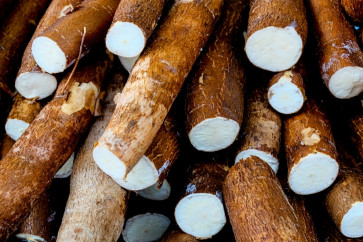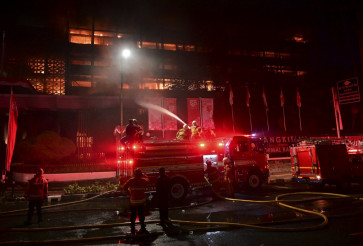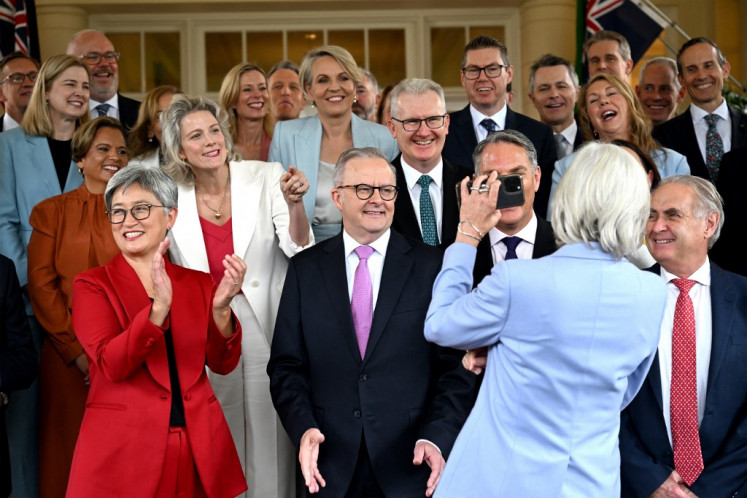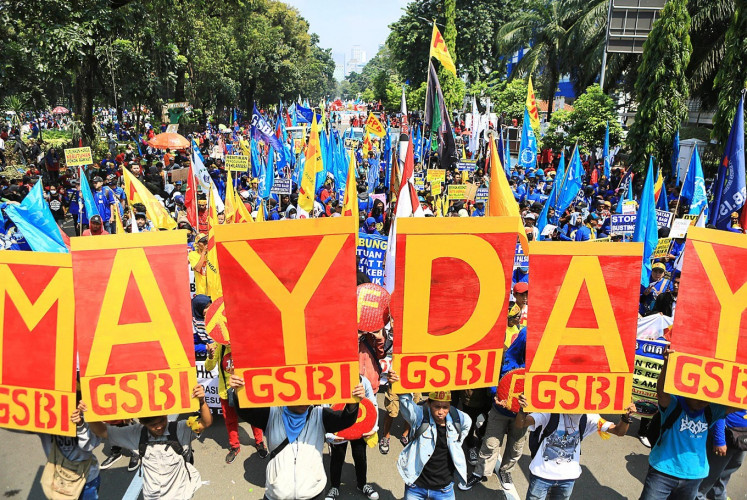From farm to cup: The delights of Balinese homegrown teas
Refreshing: Cold tea mixed with berries at Brew Me in Sanur, Bali
Change text size
Gift Premium Articles
to Anyone

Refreshing: Cold tea mixed with berries at Brew Me in Sanur, Bali. (Courtesy of Brew Me)
Two establishments have been notable in the development of homegrown tea in Bali: D’Wan Tea Mountain Side and Brew Me.
The first is a mountainous holiday villa in Jatiluwih, a village in Penebel subdistrict in Tabanan district, with a private tea plantation.
The plantation was the first of its kind on the island, offering white, green and black teas to guests who stay there.
Fresh mountain air, quiet natural surroundings and a rustic, rural ambience makes it a great place to have afternoon tea and local food sourced from the villa’s own plantation, which, according to the owner, Wawan Setiawan, was not only the first ever tea plantation on the island but the first one that is centered on biodynamic cultivation.
The previous owner of Warung Tapas in Legian said the oldest tea shrubs in his plantation were 13 years old and the youngest ones two years old. Sourced from Bandung-based tea specialist Musthopa Sarifudin Fattah, who trained and educated Wawan on tea making and processing, all of the varieties are Chinese shrubs (Camellia sinensis var sinensis).

“They are more suitable for the soil and water conditions of the land because unlike the assamica variety, they don’t need much water and humus,” Wawan explained.
Initially, tea plants were planted to recreate Wawan’s childhood hometown in rural West Java where tea plantations graced the surrounding environment.
As Wawan decided to turn his private villa into a mountainside resort, the tea plantation became a unique, distinctive feature of the resort.
“The teas that the plantation produces are sold under the Bandung L2 brand name to guest houses and hotels in Denpasar, Ubud, Seminyak and soon in Gilimanuk,” Wawan said.

He explained that the teas had local organic certification but had yet to obtain organic certification for larger-scale commercial production, for which he is not ready yet.
Wawan is particularly proud of his nutty silver needle white tea, which can be infused many times without losing flavor.
He believes in the metaphysical aspects of tea. He said the quality of the prana (Sanskrit for life force) flowing from a clean spiritual mind into the hands used to pluck and process the tea leaf would affect the quality of the resulting tea.
Elsewhere in Bali is Brew Me, the first restaurant in Sanur that serves tea produced at its own tea plantations.
Unlike the tea plantation of D’Wan Tea Mountain Side, which is owned by Wawan and run by his team, Brew Me’s tea plantations are run and owned by a company, PT Cahaya Bali Amerta.

“Except for matcha, which is imported from Japan, all the tea served at the restaurant come from Brew Me’s own plantations in Angseri and Mayungan in Tabanan,” said Brew Me tea expert, consultant and president commissioner Musthopa Sarifudin Fattah, who studied tea processing in India, China and Japan.
Mustopha was referring to the five organically certified teas he produced: Bali Black Organic, Bali Green Organic, White Peony, Silver Needle White Tea and Emerald Oolong.
Brew Me’s Bali Angseri black organic tea — a 20/80 blend of assamica and sinensis varieties created by Musthopa — is mellow, pleasantly mild and clean but lacks depth and complexity, perhaps due to the young age of the bushes, which, according to Musthopa, are “just five years old”.
Brew Me owner, founder and tea blender NP Yudia Ayu D said the first batch of Black Angseri tea was produced one year after the tea bushes were planted in late 2014-2015.
-conducts-tea-tasting-with-Brew-Me-Tea-Gallery-workshop-participants-in-this-undated-file-photo.img_assist_custom-780x816.jpg)
However, this lack of strong signature characteristics makes Black Angseri an excellent underlying base tea for making flavored teas, one of which is blended with imported French rose and vanilla flavors sold under the name of Versailles Garden. This common blend tastes and smells intensely flavorful and fragrantly floral like perfume with the black tea playing an auxiliary, unassuming role.
“Consumers like the strong flavorful taste, especially when mixed with sugar and ice,” said Musthopa.
Brew Me also has a tea gallery in Gianyar. Situated near its tea factory where tea blending takes place, the
gallery offers tea classes by appointment. Bali Cahaya Amerta president director Lodegasi Lindely said Brew Me has been exporting 15 to 20 percent of the tea it produced to Europe, Singapore and Hong Kong for two years now.
So even though Balinese tea is not as nationally well-known as Balinese coffee or Balinese wine, it is making inroads into the international market, quietly.









